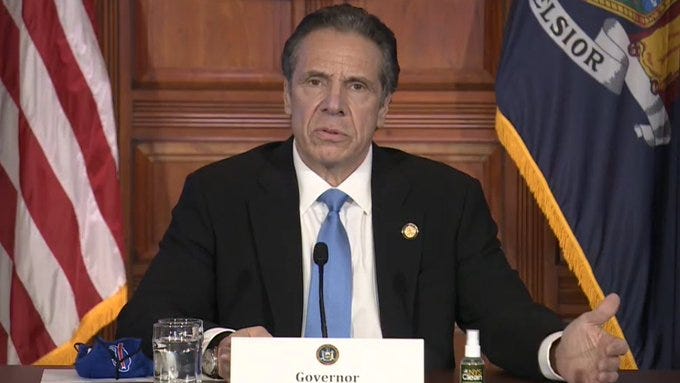
BUFFALO, N.Y. (WBEN) – Even though Albany democrats have introduced the a bill which they say will rescind Governor Andrew Cuomo’s executive powers, republicans railed against it because they said it effectively allows Governor Andrew Cuomo to keep his powers beyond April 30.
What does the bill say? Click here to read the full bill
“Much has been learned about the COVID-19 virus in the last year,” the bill reads. “The legislature finds that there has been progress in the fight against the virus with the approval and distribution of multiple vaccines in recent months. With increased knowledge including the means of transmission, prevention, and treatment of the COVID-19 outbreak and additional time to reflect, the legislature finds and declares that the governor is adequately equipped with his previously existing emergency powers and with authorization to continue existing directive extension and modification powers to deal with the situation. The legislature therefore declares that it is time to restore the pre-pandemic balance of power of the governor and legislature…”
While the intent of the bill may be to restore the balance of power, it gives the governor the ability to retain emergency powers beyond April 30, the date it was previously supposed to expire.
The governor can extend or modify any of his directives that has been previously issued in 30 day increments, so long as it an issue related to a public health directive. However, he now has to notify lawmakers of his intent to extend a directive no later than 5 days beforehand.
Cuomo cannot extend his directives more than once until he responds “to any comments provided by the chairs of the relevant committee or relevant municipal entities”.
The chairs of the respective legislative committees affected by a directive will have the ability to comment, but it ultimately does not affect whether or not the governor can proceed with it.
New York State Health Commissioner Dr. Howard Zucker can certify any directive that addresses the spread or reduction of COVID-19, facilitate vaccine distribution, or require the use of face masks.
While not explicitly said in the bill, Cuomo said Wednesday that the extension of his emergency powers will go until the federal government declares an end to the pandemic.
“Whatever order I put in place, the legislature can repeal it in 24 hours,” Cuomo said. “Or whenever they choose and that’s been the way.”
Republicans were quick to blast the bill on Wednesday.
“If the senate democrats had done nothing and continued to vote down our resolution every day,that would be better than this bill,” Senate Minority Leader Rob Ortt said. “This bill is a feckless shell, it’s worse than nothing.”
Republican Assemblyman Angelo Morinello said it’s a more of a modification than a repeal.
“It’s a watered down version to not take the governor’s powers away,” Morinello said. “(It) allows them to continue with some caveats.
One of the most glaring things is the striking of the sunset clause, which means this will go on indefinitely…It does not appear to be what the headlines are saying that it’s a repeal…I don’t believe it goes far enough.”
Morinello said there needs to be more local control over the pandemic rather than the governor controlling every aspects.
Democratic Assemblyman Bill Conrad said the legislation will ensure legislative oversight over the existing directives.
“That’s a big win for us,” Conrad said. “I think there’s a concern that if we just get rid of his powers all at once, any order the governor has issued will be instantly rolled back and there’s some orders we need to keep in place to help our citizens and businesses survive.”
Conrad, for example, said removing all the orders from the governor immediately would stop restaurants from being able to sell alcohol to go.
“It allows simple things like notary services (to be) available digitally, which allows people to avoid congregating and getting important documents notarized,” Conrad said. “It allows those things to continue.”
Conrad hailed the legislative oversight and said if the governor does not respond to the comments on his executive orders, the legislature won’t carry his directives. However, in this context, this would only apply to a second extension or modification of an order.
Lawmakers can end any executive order with a majority vote.


